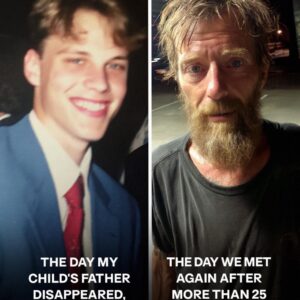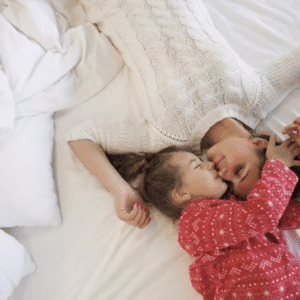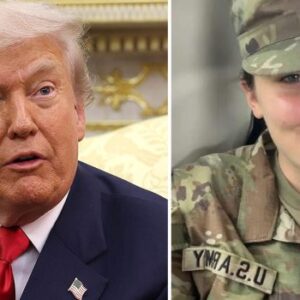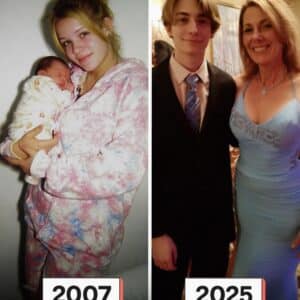I didn’t expect a 13-hour flight to change my entire life.
I boarded exhausted, ready to zone out with bad movies and worse airplane food. My seat was by the window. In the middle sat an elderly Japanese woman, clutching her boarding pass like it was a life raft. Her hands trembled every time the plane shuddered.
When the flight attendant came around with forms and menus, she just stared down, confused. She didn’t speak English, and I didn’t speak Japanese. For a moment, we both just sat there in that awkward silence between strangers.
Then I pulled out my phone and opened Google Translate.
I typed, “Do you need help?” and held it out to her.
She squinted at the screen, her eyes widening slightly when the Japanese text appeared. Then she looked at me, cautious, hopeful.
She nodded.
We spent the next half hour slowly “talking” like that. I helped her pick a meal. I filled out her customs form by asking simple questions and letting her answer in short phrases. Sometimes she would point, or mime, or laugh nervously when she got flustered. Eventually, she typed a message herself.
“I am visiting my grandson. First time. I am very nervous. Thank you.”
Something in my chest shifted.
For the rest of the flight, we communicated in broken sentences and delayed translations. I learned her name. I learned she’d never been on a plane before. I learned her husband had passed away years ago, and this trip was something she’d been both dreaming about and dreading.
When the turbulence got bad, she squeezed her armrest until her knuckles went white. I typed: “The plane is safe. You are okay.”
She read it, exhaled slowly, and nodded.
At one point, she showed me a small, worn photo of a baby boy. Her grandson. In the next picture, he was ten, missing teeth. In the last, an adult, taller than her, smiling with that same familiar softness in his eyes. She’d never met him in person.
“Soon,” I typed. “You will hug him soon.”
When we landed, she thanked me through the app, bowed, then hesitated like she wanted to say more but didn’t have the words or the time. We got pulled into separate lines, swallowed by crowds and fluorescent lights.
I figured that was it—the end of a small, meaningful, but passing encounter.
A week later, I got a text from an unknown number.
It was in Japanese.
My first thought was spam. I almost deleted it. Then something tugged at me. I copied the message into Translate.
“Hello. This is the woman from the airplane. My grandson helped me write this. Thank you for your kindness. You made me brave. My grandson would like to thank you too. If you are comfortable, can we invite you for tea?”
I just stared at the screen.
Apparently, they’d gotten my name through the airline’s contact tracing documents and tracked down my number. Part of me thought, This is weird. Don’t people just move on? Another part remembered her shaking hands and that tiny, relieved smile.
I said yes.
We met at a small tea shop a few blocks from my apartment in San Francisco. I got there early, nervous in a way that felt ridiculous considering I’d already survived a long-haul flight with this woman.
He walked in right on time.
Mid-30s, clean-cut but relaxed, hands in his pockets, eyes that crinkled when he smiled. He bowed slightly.
“I’m Kaito,” he said. “My grandmother calls you her ‘sky angel.’”
I laughed, flustered. “That’s… a lot of pressure.”
He grinned. “She was very scared. You made her feel safe. For that, my whole family is grateful.”
We talked for an hour. He told me how she had practiced the journey with him in her small apartment for weeks—how many steps to security, where to put her shoes, how to hold her passport. She had been terrified she’d mess it up and be sent home.
“She hasn’t stopped talking about you,” he said. “She said a stranger made her feel like she wasn’t alone.”
Before we left, he reached into his bag and handed me a small paper pouch.
“This is from her,” he said.
Inside was a hand-sewn little case. Nestled inside that was a folded square of fabric with an embroidered crane—delicate stitches, pale blue thread, my name in English on the back in tiny, careful letters.
“She said you helped her fly,” he added.
I didn’t know what to say. It’s not often in life that someone hands you something so openly symbolic and pure without irony.
We kept in touch after that.
Not in some sweeping, cinematic romance kind of way—people always ask that—but slowly, organically, like family you didn’t know you had. He worked in community development. I was in UX design. On paper, totally different worlds. In reality, we cared about the same things: people, small acts that mattered, the invisible threads that hold a community together.
He once said over tea, “Everyone wants to change the world, but the world is mostly made of small moments—someone helping with a form, someone carrying a bag, someone listening. That’s where it actually changes.”
I wrote it down when I got home. It stuck.
Over the next year, we built a friendship out of those small moments. When I lost my job during a wave of tech layoffs, he showed up with bento boxes and quietly sat with me on my couch while I cried about rent and resumes and the sudden free fall of it all.
He didn’t give me motivational speeches or productivity hacks. He just let me be devastated without making me feel like I was failing at “staying positive.”
When he was struggling to get funding for a park project in the Mission—an inclusive space designed for kids with disabilities—I helped him polish his proposals, rearranged sections, adjusted the language to make sense to people who didn’t speak “policy.”
We became each other’s sounding boards, emergency contacts, and occasional delivery drivers.
Then everything changed again.
It was a rainy Thursday. Grey sky, slick sidewalks, that metallic smell of wet concrete. I was walking home from yet another interview, tired and glued to my email, when my phone buzzed.
It was a message from his number, but not from him.
His cousin wrote that there had been a car accident. A drunk driver had blown a red light. Kaito was in the ICU. Unconscious.
I dropped my umbrella where I stood.
I don’t remember the ride to the hospital. I just remember the fluorescent hallway and the sound of some distant monitor beeping. His grandmother was there, smaller than I remembered, eyes swollen, hands folded around a rosary.
She grabbed my hand as soon as she saw me, clinging so hard I could feel the tremor in her bones. We didn’t need Google Translate for that.
For two days, he didn’t wake up.
I sat by his bed and read aloud from his favorite things—articles about community gardens, notes from his project documents, passages from a book he’d once said “felt like home.” I talked to him about the park, about the kids who would someday race down ramps and swing from handles he’d designed.
On the third day, his fingers twitched.
I paused, staring. His eyelids fluttered, then finally lifted.
He looked disoriented, like his brain was piecing reality back together in slow motion. His gaze moved from the ceiling to the window, then finally to me.
“You kept reading,” he whispered, voice ragged.
“Yes,” I said, wiping my eyes. “You’d do the same.”
His recovery was long and messy. Physical therapy. Speech therapy. Endless checkups. He had to relearn things he’d once done on autopilot—standing, walking, taking the stairs.
I watched it all.
I watched him struggle and swear and then laugh at himself. I watched him go from gripping a walker with white knuckles to limping unassisted down the hallway. I watched his grandmother scold him into doing his exercises when he was being stubborn.
And somewhere in that long stretch of exhaustion and hope, something between us shifted.
It wasn’t a lightning bolt.
It was the way he texted first now: “How did you sleep?” not “Did you see the email?”
The way he listened when I talked about what I wanted from my life, not just what was going wrong.
The way his grandmother would watch us and smile like she knew a secret we hadn’t said aloud yet.
Months later, when he was strong enough to walk properly, he asked me to come with him to see something.
The park was finally open.
It wasn’t huge, but it was beautiful—ramps instead of stairs, swings you could wheel a chair onto, sensory panels with textures and colors for kids who saw and felt the world differently.
We walked slowly through the entrance, and I looked around, genuinely impressed.
Then I saw it.
Near the central garden, on a low stone wall, there was a small metal plaque. It had his name, the organization’s name… and mine.
“Kaito,” I said, stunned. “Why am I on this?”
He shifted, suddenly shy. “Because I didn’t build this alone. When I was ready to quit, you pushed me to keep going. You edited proposals until midnight. You believed in it when I didn’t. So this is ours.”
I stood there in the park he’d dreamed up, while kids’ laughter floated in the background, and for once in my life, I was completely speechless.
That evening, as the sun slipped down behind the buildings and the park lights clicked on one by one, we sat on a bench watching children play.
Without looking at me, he reached for my hand.
This time I didn’t pretend to adjust my sleeve or fix my hair. I let his fingers lace through mine.
The word “love” didn’t show up overnight. It arrived slowly, in the little things. In tea refills and hospital chairs, in proofreading emails and walking each other home.
A few years later, we got married.
We chose the same park. It felt right. It was small—just close friends, family, and a handful of colleagues who’d watched his projects and our friendship unfold over the years.
His grandmother wore a soft pink kimono and cried openly through the ceremony, dabbing her eyes with a delicate handkerchief. Afterward, she pressed something into my palm.
Another embroidered crane. This time, two names stitched into the wings.
Mine. His.
“Together,” she said in Japanese, smiling. I didn’t need the app anymore to understand.
Time moved forward.
We had a daughter. We named her Hana, after his grandmother. She grew up with her grandmother’s stubbornness and her father’s calm. By the time she was tall enough to reach the kitchen counter, she already understood that kindness wasn’t an event—it was a habit.
Every night, she’d climb into bed and ask, “Tell me the airplane story.”
So I did.
I told her about a frightened woman on a long flight, a language barrier bridged by an app, and a cloth crane that carried more love than some relationships I’d had. By seven, she could correct me if I swapped the order of events.
Then life decided to test us again.
When Hana was seven, she got sick.
First, it was just fatigue and strange little tremors. Then came hospital tests, murmured consultations in hallways, medical terms that felt like a foreign language.
A rare autoimmune condition, they said. It attacked her nervous system.
Same hospital. Different floor. Same sterile smell.
We camped out by her bed for weeks. I slept in a plastic chair that broke my back, Kaito in another one that broke his. His grandmother, older and frailer now, shuffled in every day with food, prayers, and that quiet determination that only comes from having already survived too much.
Some nights I sat alone by Hana’s bed, fear pressing heavy on my chest. I watched machines blink and thought about how absurd it was that wires and numbers could define “okay” or “not okay.”
On one of those nights, I was tracing the sewn lines of the crane pinned above her bed and whispering the airplane story to her, even though she was too tired to fully respond. Her lips curled in a small smile anyway, eyes half-closed.
That’s when a new nurse came in.
Young, mid-20s, a little nervous in the way people are when they’re still growing into their job. He checked her chart, adjusted a line, then paused.
His eyes drifted to the crane.
“My grandmother used to make those,” he said suddenly. “She gave one to a woman on a plane once. Said it changed her life.”
Everything inside me went still.
I looked up at him. “What was your grandmother’s name?”
“Hana,” he said. “She passed away a few years ago.”
I stood up slowly.
“I sat next to her on that flight,” I said.
He just stared at me for a second, then smiled, wide and disbelieving.
“Then I guess,” he said softly, “my family owes you more than I knew.”
He stayed assigned to my daughter’s case from then on, checking in even when his shift technically ended, always making time to answer her million questions with patience and warmth.
Hana pulled through.
It wasn’t quick. It wasn’t easy. But she did it. She’s fourteen now, stubborn as ever, already talking about medical school and “fixing things from the inside.”
Last week, I found her at the kitchen table with a notebook full of cranes—different sizes, wings spread wide, tiny names written along the edges.
“What are these for?” I asked.
She shrugged, shy but proud. “I thought maybe… when I’m older, I can give them to people in hospitals. You know. So they don’t feel alone.”
I swallowed around the fullness in my throat.
“That sounds perfect,” I told her. “You’d be surprised how far a small kindness can travel.”
Because here’s the thing: my entire life as I know it exists because I didn’t ignore a nervous stranger on a plane.
I could’ve put in my headphones. I could’ve slept. I could’ve decided it was “too awkward” to help. Instead, I opened an app and typed one sentence.
Do you need help?
From there came tea with her grandson. A cloth crane. A friendship. A park. A hospital bed. A hand held. A wedding. A child. A second crane. A nurse. A third generation of kindness.
All because of one tiny, ordinary choice.
Life doesn’t always arrive with trumpets. Sometimes it comes as a quiet request for help on a screen, a shaky hand, a seatmate on a red-eye who just needs someone to look at her and say, in any language, You’re not alone.
If there’s anything I’ve learned, it’s this: the smallest kindness you offer might be the biggest turning point in someone else’s life—and, unexpectedly, in your own.





